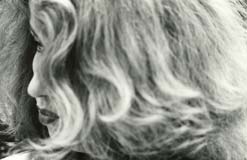
Hélé Béji
- Tunisia
- Zu Gast beim ilb: 2006
Hélé Béji was born in Tunis in 1948 and grew up in a liberal family, the daughter of a Christian mother and Muslim father. The possibility of experiencing the Islamic tradition without any compulsion to conform to it was formative for her entire work. She studied Modern Languages and qualified as a university lecturer in Paris in 1973. She later taught French Literature at the University of Tunis and worked in international affairs at UNESCO. In 1998 she founded the Collége international de Tunis, a cultural centre devoted to intellectual exchange between the southern Mediterranean region and Europe, the USA and Latin America, focusing on literature, art, philosophy, history and sciences in general. She currently works as the centre’s director. Béji came to the fore in the public sphere through a number of essays and prose pieces, a novel and numerous articles which are all concerned with Islamic cultural heritage and the latter-day influence of the West. In her first essay, “Désenchantement national” (1982; t: National disenchantment), she addresses the unresolved hope of postcolonial independence and denounces the misuse of Western concepts such as nationalism and individualism within the Arab world. In 1997 she took up this issue again in the essay “L’imposture culturelle” (1997; t: The cultural deception). In her autobiographical novel, “L’œil du jour” (1985; t: The day’s eye), she evokes the idyllic family life of her childhood as a symbol of a past harmony which – subject to Western influence – has lost its currency. Through the character of the mother, for instance, femininity is depicted as a model for the tension between tradition and modernity, Orient and Occident, security and freedom. As in her last essay, “Une force qui demeure” (2006; t: An abiding force), Béji attempts to understand this tension as richness and a source of strength. Through finely tuned poetic language often charged with personal memories, she describes the precarious situation of modern woman, who at the price of her cultural roots and femininity has gained the qualities of equality and autonomy. This dilemma is solved by considering humanity as the common ground of both principles. “Woman’s virtue does not reside with her female identity, but rather with her human identity. As I see it, transcending the women’s issues raises questions facing humanity. For questions of women’s rights are not limited to a feminist discourse but include, rather, quite definitely, the destiny of our era: the confrontation between tradition and modernity.” Béji has received numerous prizes for her work, among them the Prix de l’Afrique méditerranéenne, the Prix de la création littéraire and the Grand Prix de l’Association d’amitié France-Tunisie. The author lives and works in Tunis.
© internationales literaturfestival berlin
Désenchantement national
Maspéro
Paris, 1982
L’œil du jour
Nadeau
Paris, 1985
Itinéraire de Paris à Tunis
Noël Blandin
Paris, 1992
L’Art contre la culture
Intersignes
Paris, 1994
L’Imposture culturelle
Stock
Paris, 1997
Une force qui demeure
Arléa
Paris, 2005
